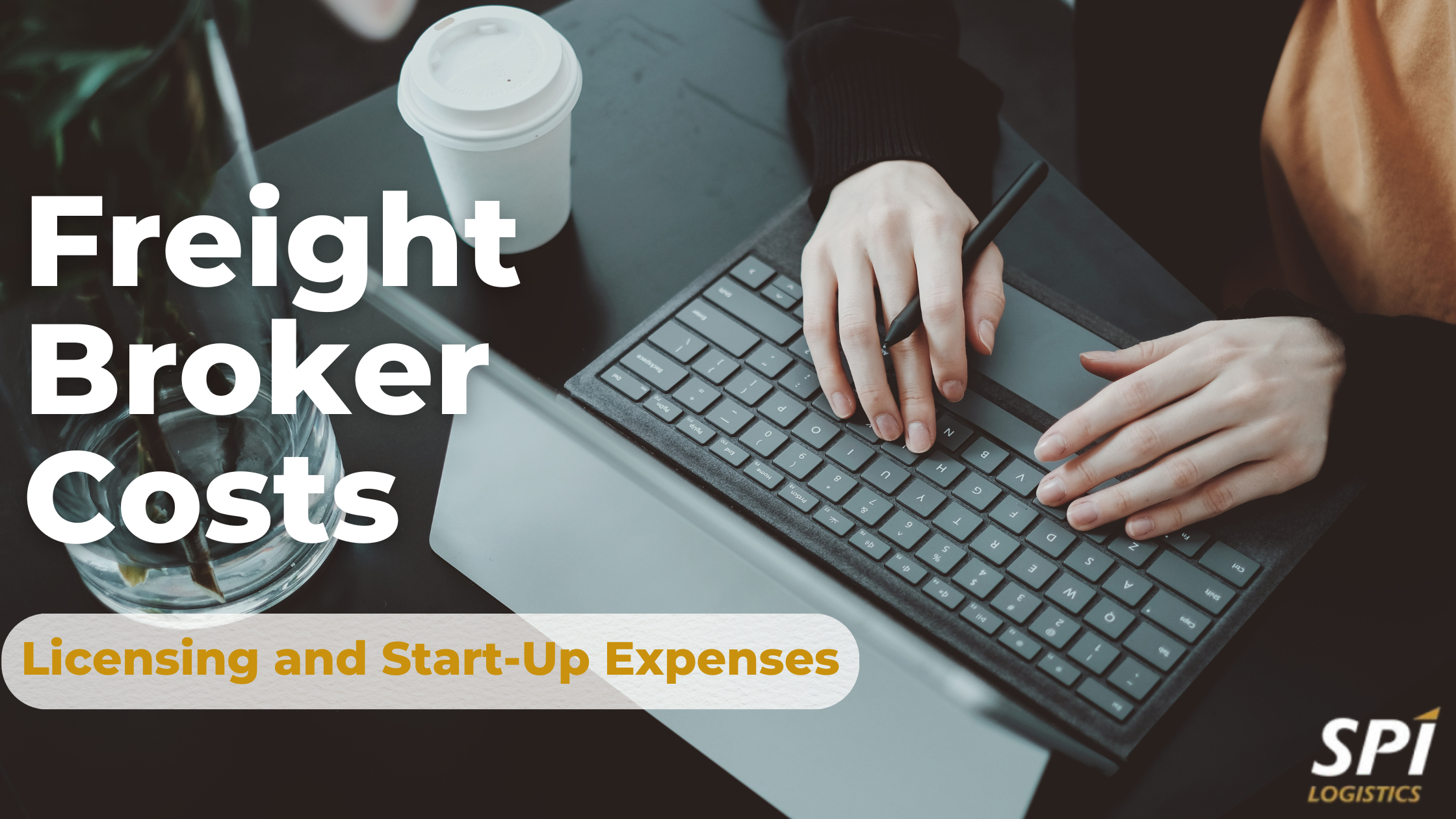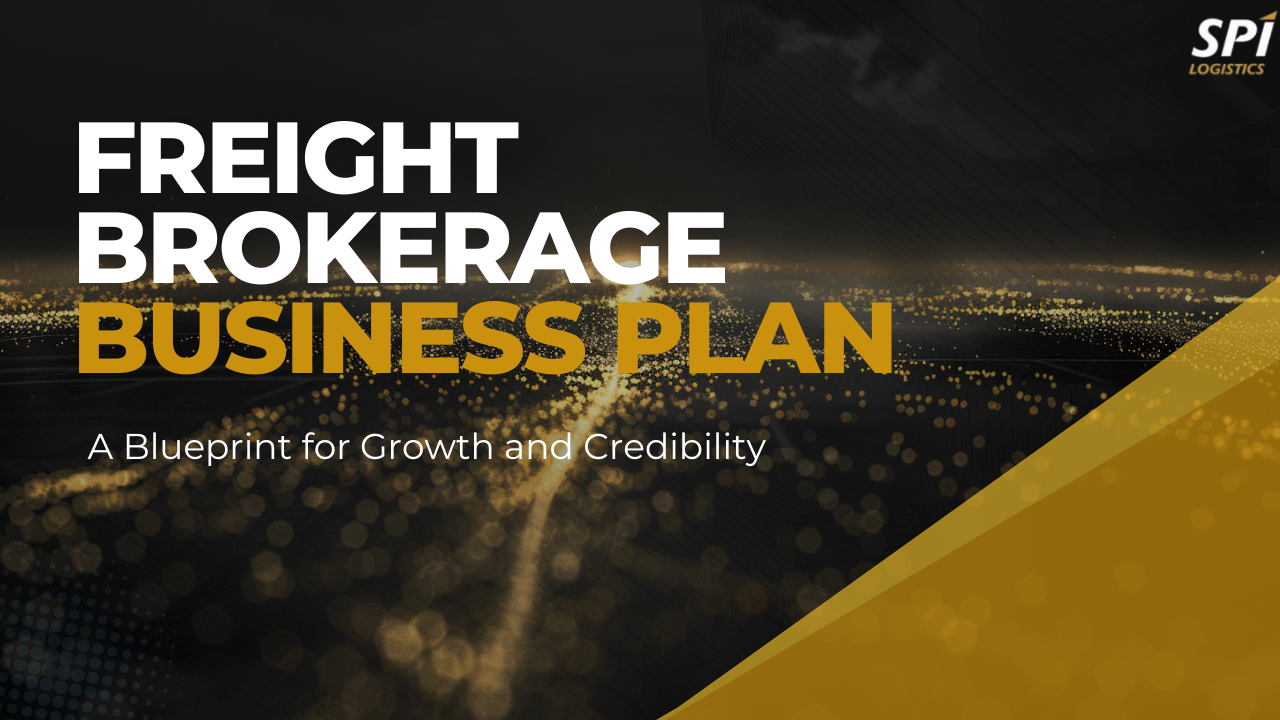Becoming a freight broker is an exciting opportunity in the logistics industry. It offers entrepreneurs a chance to build a profitable business while facilitating freight transportation. However, before diving in, it’s essential to understand the financial requirements, including licensing, insurance, and start-up costs. This guide breaks down the expenses of becoming a freight broker and what you need to get started.
What is a Freight Broker License, and How Is It Used?
A freight broker license is an authorization granted by the Federal Motor Carrier Safety Administration (FMCSA), allowing individuals or companies to arrange transportation services between shippers and carriers. This license is essential for anyone looking to operate legally in the freight brokerage industry. The truck broker license cost and freight broker license cost are crucial considerations for those entering the field, as they impact initial business expenses. The primary use of this license is to ensure compliance with industry regulations while enabling brokers to build strong relationships with carriers and shippers (FMCSA, n.d.).
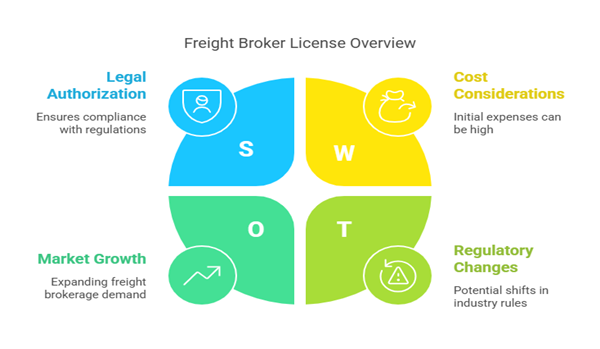
“A freight broker license is more than just a regulatory requirement; it’s a tool that establishes credibility and trust in the logistics industry. Without it, brokers risk fines and losing potential clients who demand compliance and reliability.”
Understanding the Cost of a Freight Broker License
One of the primary expenses for starting a freight business is obtaining the necessary licensing. The truck broker license cost varies depending on regulatory requirements, but the application fee for a broker authority through the Federal Motor Carrier Safety Administration (FMCSA) is typically $300. This fee covers the freight broker license cost and is a necessary step to operate as a broker legally.
Beyond the application fee, brokers must secure a $75,000 surety bond or trust fund agreement, which protects shippers and carriers financially. The actual cost of obtaining this bond depends on credit history and financial stability and ranges from $1,000 to $10,000 annually (TIA, n.d.).
“The surety bond acts as a financial safeguard, ensuring that brokers operate with integrity. For brokers with excellent credit, costs remain manageable, but those with lower scores should plan for higher premiums.”
What was the biggest surprise in the process if you’ve obtained a freight broker license? What concerns do you have about bonding or licensing costs for those just starting?
Steps to Getting a Freight Broker License
If you’re considering becoming a freight broker, follow these steps to obtain your license:
Begin Operations and Build a Network – Connect with shippers and carriers to build your brokerage business once your license is approved.
Meet Eligibility Requirements – Ensure you meet FMCSA requirements, including being at least 18 years old and possessing a strong understanding of the logistics industry.
Establish a Business Entity – Register your business as an LLC, corporation, or sole proprietorship and obtain an Employer Identification Number (EIN) from the IRS.
Obtain a USDOT Number – Although brokers do not operate trucks, a USDOT number is still required for regulatory tracking purposes.
Apply for Broker Authority – Submit an application with the FMCSA and pay the broker authority cost of $300.
Secure a Surety Bond or Trust Fund – Obtain the required $75,000 surety bond to protect clients in case of financial issues.
Get Freight Broker Insurance – Research and purchase the necessary freight broker insurance cost policies to protect your business and comply with FMCSA regulations. Several types of insurance are essential for freight brokers:
General Liability Insurance: Covers claims related to bodily injury, property damage, and legal costs. This insurance typically costs between $500 and $3,000 annually (Progressive, n.d.).Contingent Cargo Insurance: Protects brokers if a carrier’s cargo insurance fails to cover damage or loss. Costs range from $500 to $2,500 per year (TIA, n.d.).Errors & Omissions (E&O) Insurance: Provides coverage for mistakes, negligence, or miscommunications that could result in financial losses. Expect to pay between $1,000 and $3,000 annually (FMCSA, n.d.).
Cyber Liability Insurance: Covers data breaches and cyber threats, crucial for brokers handling digital contracts and sensitive client information. Costs vary but typically start at $500 annually (TIA, n.d.).
Complete Freight Broker Training – Although optional, investing in training programs can help new brokers gain industry knowledge. If you’re wondering how much freight broker training costs, it can range from $500 to $3,000, depending on the course depth (DAT Freight & Analytics, n.d.).
Set up Office and Technology – Invest in business software, load boards, and other tools to operate efficiently.
Register for a Process Agent – Brokers must designate a process agent in each state to handle legal documents.
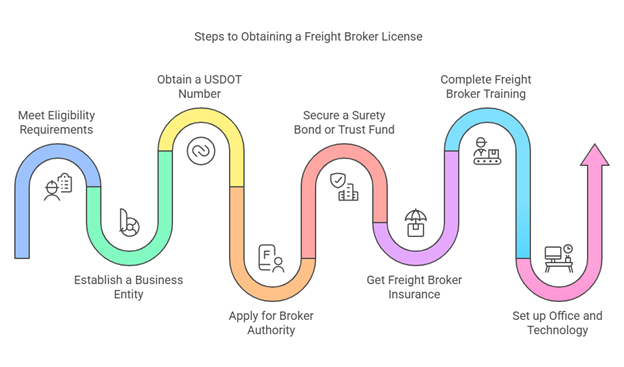
“Having the right insurance policies in place ensures that freight brokers can operate with confidence. Neglecting this step can lead to severe financial consequences in the event of disputes or claims.”
Which step in the licensing process do you think is the most challenging for new brokers? Would you prioritize training before licensing or vice versa?
How Much Does It Cost to Become a Freight Broker?
If you’re wondering how much it costs to become a freight broker, the answer varies based on factors such as insurance, software, and office setup. The freight broker start-up cost can range between $3,000 and $15,000, depending on individual business needs (TIA, n.d.).
Much of this investment includes freight broker insurance cost, which depends on coverage limits and the types of freight handled. General liability insurance, contingent cargo insurance, and errors and omissions (E&O) insurance are essential for protecting your business and ensuring compliance with industry standards.
Breaking Down Freight Broker Start-Up Costs
For those asking how much it costs to start a freight brokerage, here’s a breakdown of typical expenses:
- Broker Authority Cost: $300
- Surety Bond: $1,000 – $10,000 annually
- Freight Broker Insurance Cost: $2,000 – $5,000 annually
- Office Equipment & Software: $500 – $5,000
- Marketing & Branding: $1,000 – $3,000
- Miscellaneous Fees: $500 – $2,000
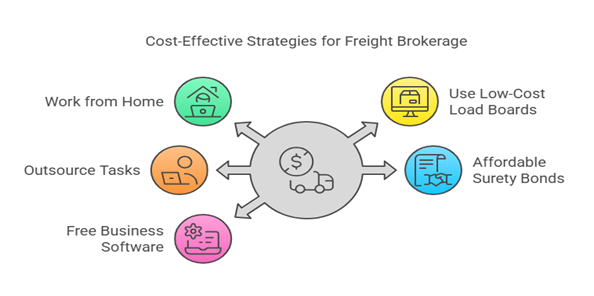
“Starting lean allows new brokers to minimize risk while establishing their client base. Strategic cost-cutting ensures that funds are allocated to business growth rather than unnecessary overhead.”
Looking for budget-friendly freight broker solutions? Explore our Freight Broker Solutions to streamline your startup process!
Freight Broker Training and Education Costs
While not a legal requirement, training can be invaluable for new brokers. If you’re considering professional education, you might ask, how much does freight broker training cost? Programs range from a few hundred dollars for online courses to several thousand dollars for in-depth training with industry experts. On average, freight broker training costs between $500 and $3,000, depending on the program’s depth and support resources.
Here’s what to consider:
-
Types of Training Programs:
- Online courses ($500 – $1,500)
- In-person workshops ($1,000 – $3,000)
- Comprehensive programs with mentorship ($2,500+)
-
Benefits of Training:
- Understanding industry regulations and best practices
- Learning how to use freight brokerage software
- Gaining networking opportunities with industry professionals
“Investing in freight broker training is one of the best decisions for a business. Not only does it help avoid costly mistakes, but it also accelerates the learning curve, providing the tools and industry connections needed to succeed.”
Excited to launch your career as a freight broker? Become a Freight Broker and access expert training & resources!
Frequently Asked Questions (FAQs)
How much does it cost to become a freight broker?
The total freight broker start-up cost varies, but it typically ranges between $3,000 and $15,000, depending on factors like insurance, software, and office setup (TIA, n.d.).
- How much is a freight broker license?
The freight broker license cost includes a $300 application fee and a $75,000 surety bond requirement, with annual costs ranging from $1,000 to $10,000 (FMCSA, n.d.).
- How much does freight broker training cost?
If you’re considering training, expect to pay anywhere from $500 to $3,000, depending on the course and provider (DAT Freight & Analytics, n.d.).
- How much is a broker license for trucking?
The broker authority cost for trucking brokers includes licensing fees, insurance, and bonding, totaling between $3,000 and $15,000 to start (TIA, n.d.).
- What is the freight broker insurance cost?
Insurance expenses vary, but general liability, contingent cargo, and errors & omissions insurance typically cost between $2,000 and $5,000 annually (Progressive, n.d.).
Start Your Freight Broker Career the Right Way
Starting a freight business requires an initial financial commitment, but it can be lucrative with the right approach. Understanding the freight broker license cost, freight broker insurance cost, and freight broker start-up cost allows for better financial planning and long-term success. By investing in proper licensing, training, and insurance, you can build a thriving freight brokerage and take advantage of the growing demand in the logistics industry.
“Ready to launch your freight business? Contact us for expert guidance on licensing, insurance, and everything you need to succeed.”
References
DAT Freight & Analytics. (n.d.). Freight Broker Training. Retrieved from https://www.dat.com
Federal Motor Carrier Safety Administration (FMCSA). (n.d.). Freight Broker Licensing. Retrieved from https://www.fmcsa.dot.gov
FreightWaves. (2023). Freight Brokerage Success Stories. Retrieved from https://www.freightwaves.com
Progressive. (n.d.). Freight Broker Insurance. Retrieved from https://www.progressive.com
Transportation Intermediaries Association (TIA). (n.d.). Freight Broker Bonding & Insurance. Retrieved from https://www.tianet.org

